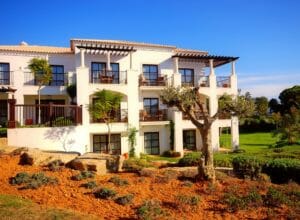Portugal Property Market Set For Strong Growth

In 2008 60% of buyers on the Algarve originated from the UK and Ireland according to Knight Frank. Demand from Britain has been in slight decline with the uncertainties over Brexit a major factor and if this can be resolved the demand is likely to increase. Over recent years buyers from Scandinavia, Germany and the Benelux have become more important. Buyers from France have also increased over the last couple of years. The country’s Golden Visa scheme is also proving popular with an investment of €500,000 in property giving the right to residence. This is particularly popular with those from Russia, China and South Africa.
Another factor in the growth of foreign investment in property in Portugal is the success of its Non Habitual Residence Scheme (NHR). This scheme attracts retirees and high net worth individuals by offering no tax on foreign pensions and other income for ten years as well as reduced tax rates on Portuguese. The inheritance tax regime is also favourable in Portugal with inheritance tax replaced by stamp duty and only payable on Portuguese assets. There are also exemptions for direct descendants. Together these create an attractive fiscal environment for those wanting to move permanently or retire to Portugal
Overseas Guides Company also point to the return of Portuguese natives who left the country in the wake of the financial crisis. It is estimated that around 350,000 of the half million who left have now returned. They report Lisbon and the Algarve as the primary ‘hot spots’ with more modest price increases in other areas.
2018 saw good increases in the Algarve with estimates ranging from 6.5% to 9.5%. The Statistics Institute reports a 7.3% increase in Lisbon.
Prospects for 2019 seem good and pundits have generally predicted another good year, subject to some concerns about the uncertainties around the global economy. With demand for properties in the Algarve exceeding supply in 2018 pressure on prices continues. Both new builds and good quality resales have been snapped up according to Land and Houses Algarve.
Golden Tree Real Estate are also upbeat about 2019 stating that as we begin 2019, the Portuguese property market remains buoyant, building on the success of 2018 and helping to fuel predictions of a record breaking year in 2019. They quote RICS Chief Economist, Simon Rubinsohn who said: “Although results suggest momentum has eased somewhat, forward looking metrics are still suggestive a reasonably solid outlook for the market. Indeed, the macro fundamentals remain strong, which should help provide a positive backdrop for housing market activity in the near term”.
A recent report carried out by the American financial ratings agency Standard & Poors (S&P) forecasts property prices in Portugal to rise by 9.5% in 2018 this year, slowing down to 7% in 2019, 6% in 2020 and 5% in 2021. This forecast places Portugal, along with Ireland as the European countries with the sharpest increase in real estate prices.
Even though property construction is on the increase in Portugal, strong domestic and international demand is creating a housing shortage. S&P believes that the Portuguese market “remains affordable”, with “a price-earnings ratio still seven percent below the long-term average” and that “limited supply coupled with strong domestic and external demand is fuelling house price inflation”.
Strengthening this demand is “robust economic growth, job creation and low interest rates” as well as falling unemployment and “special incentives” such as the Golden Visa Scheme and the Non Habitual Residency programme. The ratings agency concludes that the Portuguese real estate market should “remain dynamic over the next few years, supported by job creation and increased incomes, as well as by external demand”.
Land and Houses Algarve also point to the advantages of renovation properties in town centres where the urban rehabilitation program gives several benefits, such as a lower VAT rate (6%) on construction materials reducing costs by around 10%, no cost for the building licence, exemption of IMT (property transfer tax) and exemption of IMI (council tax) for three years. It is also possible to get preferential interest rates from some banks for financing renovation costs.
Brexit will clearly be a factor in how many British citizens decide to move or retire to Portugal. If there is a positive outcome we are likely to see pent up demand released. If there is a ‘no deal’ Brexit the impact is more uncertain. The terms of the Golden Visa and the NHR scheme are already attracting people from outside the EU and these terms will presumably be available to British citizens whatever the outcome of Brexit.